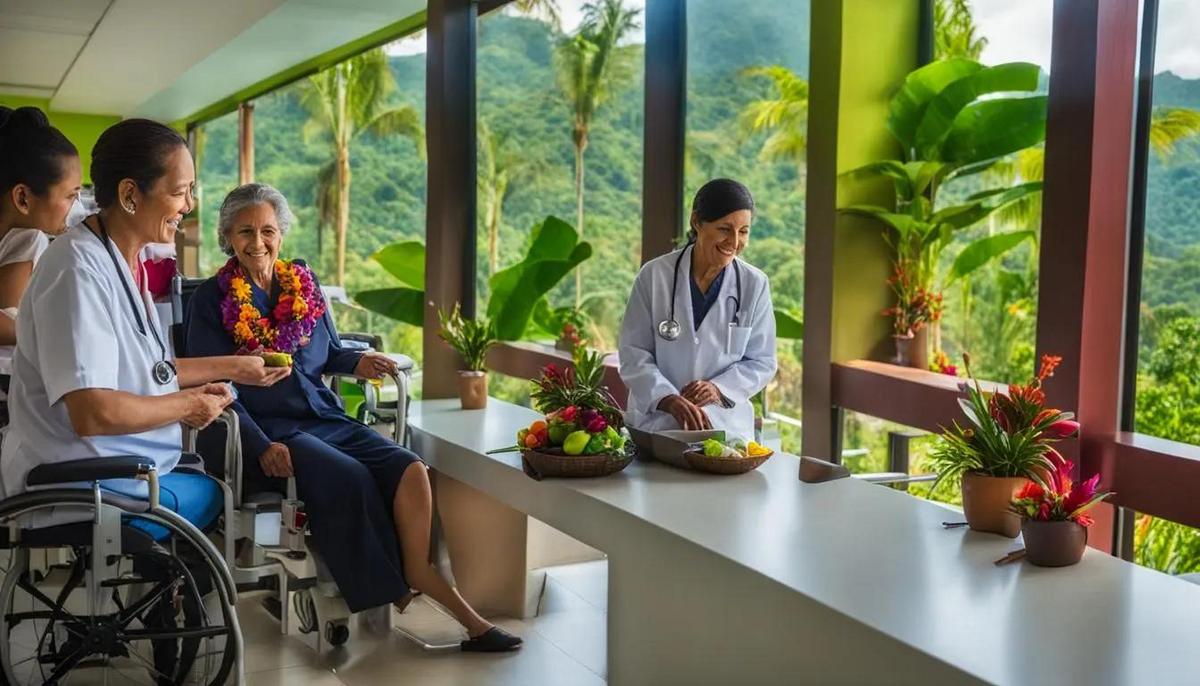TL;DR:
- Costa Rica has public (CCSS) and private healthcare systems.
- Public system funded by taxes; accessible via residency and monthly fees.
- Private care is quicker, more modern, but costlier than public care.
- US citizens need to become residents and pay fees to use public services.
- Costs: Public healthcare $50-$100/month; private doctor visit ~$50; knee replacement ~$12,000.
- Medicare doesn’t cover care in Costa Rica, but some Advantage plans do emergencies.
- Enrolling in CCSS provides basic care; private services offer quicker options.
- Expats often recommend healthcare but highlight long waits and language barriers in public system.
- Join expat groups for recommendations and navigating the system.
Is retiring in Costa Rica the dream you’ve been chasing? Before you pack your bags, let’s talk about healthcare. In this post, I will break down Costa Rica’s public and private health care systems, compare them, and delve into costs, access, and quality. We’ll answer top questions about healthcare for retirees so you can make a smart choice. Ready to find out if Costa Rica’s healthcare is the best for your golden years? Let’s dive in!
What Types of Health Care Systems Are Available in Costa Rica?
Costa Rica offers two main health care systems: public and private. The public system, known as CCSS (Caja Costarricense de Seguro Social), is funded by taxes. It covers hospitals and clinics all over the country. Service at public hospitals can be slow due to high demand. Yet, the quality of care is notable.
US citizens can get healthcare in Costa Rica. To access public services, they need to be part of the system. This is possible by becoming a resident and paying monthly fees. Public health care can be very affordable. However, it is wise to plan ahead and be patient.
On the other hand, private health care options are abundant. Private hospitals and clinics offer faster service than public hospitals. They have modern facilities and often cater to expat needs. Private care can be more expensive, but it is still much cheaper than in the U.S.
Regarding the quality of care, both systems have skilled doctors and nurses. However, private hospitals are usually more comfortable. Many private facilities offer bilingual services, making it easier for English speakers to navigate.
When comparing public and private health care, it boils down to cost and convenience. Public services are cheaper but may require longer wait times. Private care is more costly but offers quicker access and more comfort. Both systems have their pros and cons, but together they form a robust health care framework.
If you want more detailed information on this topic, visit this comprehensive guide on Costa Rican health care.
How Much Does Health Care Cost in Costa Rica for Retirees?
How much does health care cost in Costa Rica? You will find it depends on the service. If you use public hospitals, costs are very affordable. Costa Rica has a public health system called CCSS. Under this system, you can receive care in public hospitals for very low fees. Many retirees pay between $50 and $100 per month for care.
The cost of medical treatment in private hospitals and clinics is higher. However, compared to the United States, it is still affordable. A visit to a private doctor might cost you around $50. Surgeries and procedures also cost much less than in the U.S. For example, a knee replacement surgery can cost around $12,000 compared to $30,000 in the U.S.
There are affordable health care options for retirees. If you join the public system, your costs will be low. You can also buy private health insurance for retirees. Local insurance plans can range from $60 to $200 per month. These plans can cover private hospitals and clinics.
Medicare coverage in Costa Rica has limitations. Medicare does not cover you outside the U.S. Some Medicare Advantage plans might offer emergency coverage abroad. However, it is best to check your specific plan. Many retirees buy extra travel insurance to cover emergencies.
When comparing costs, Costa Rica offers a big saving. Public healthcare is very cheap. Private healthcare is less expensive than in the U.S., even for serious treatments. For more details, you can visit the official Costa Rica health page.
What Should Retirees Know About Finding and Accessing Healthcare in Costa Rica?
Steps to Accessing Medical Care as an Expat
Accessing medical care starts with enrolling in the public health system. Called the Caja Costarricense de Seguro Social (CCSS), it provides basic healthcare services. You can also choose private health services for quicker care and more options.
Finding Reliable Doctors and Specialists
Finding a good doctor is key. Start by asking other expats for recommendations. Many doctors in Costa Rica speak English, making it easier for you to communicate. You can also search for specialists through expat forums and local expat communities.
Emergency Medical Services (Availability and Costs)
Emergency care is available at both public and private hospitals. The cost varies: public hospitals are cheaper but may have longer wait times. Private hospitals are more expensive, but you get quicker service. Always carry your ID and know the emergency numbers (112 and 911).
Expat Health Care Experiences and Recommendations
Expats often share positive experiences about the healthcare in Costa Rica. They find it affordable and are impressed by the quality of care. However, there can be some problems. Lengthy waits in public hospitals and possible language barriers are common issues retirees might face.
Navigating the Healthcare System as a Foreign Retiree
Navigating the system can be overwhelming. Join expat groups and online communities to get more insights. These communities are valuable; they provide advice on doctors and facilities, share experiences, and help with paperwork.
Expat-Friendly Healthcare Facilities and Services
Many clinics and hospitals cater to expats. They’re modern and have up-to-date equipment. Look for hospitals that offer bilingual services to ensure smooth communication. This makes your healthcare visits less stressful and more efficient.
Conclusion
In Costa Rica, both public (CCSS and hospitals) and private healthcare options are available. Each has its own strengths. Public healthcare is affordable but can be slow, while private care offers faster service at a higher cost. Retirees will find affordable health care options and various insurance plans. Although Medicare doesn’t cover Costa Rica, many find it cheaper than in the U.S. Remember, accessing and navigating healthcare in Costa Rica requires patience and local knowledge, but it can be a rewarding experience with proper preparation.












